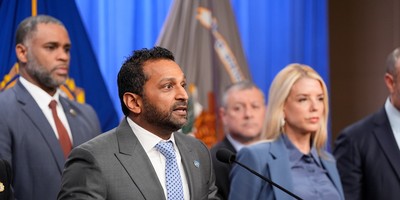President Obama's post-Labor Day "jobs" speech will be his last chance to launch an economic policy with any chance of manifesting its effect -- both economic and political -- before the November 2012 elections.
He has three options. In order of descending likelihood they are: a timid hodgepodge of previous proposals, a bold left of center initiative or a turn to free markets "nuclear option."
It's that nuclear option that is the most fascinating and most unlikely. He could decide to embrace all the major Republican, Tea Party, free market ideas: marginal business and personal tax rate cuts (leading to a net tax cut); big discretionary spending cuts to be implemented before the 2012 election; genuine long term reductions in Medicare, Medicaid and Social Security costs written into law now; major deregulation -- including the U.S. Environmental Protection Agency, Dodd-Frank financial burdens and nanny-state consumer regulations; unlimited oil- and gas-drilling, and shale-fracking authorization; permanent extension of the Bush tax cuts, repeal of the double tax on American corporations' foreign profits, limits on unemployment insurance extensions; and withdrawal of his big union initiatives, such as the National Labor Relations Board's opposition to Boeing Co. building a factory in South Carolina.
Republicans would, of course, vote for them all, as they are Republican positions. The Republican candidate for president as well as GOP congressional candidates would be left with almost nothing (except opposition to Obamacare) on the economic front to oppose in the president's policies.
Recommended
Here's the kicker, if all those proposals were passed in to law, with overwhelming bipartisan support, it might well trigger an explosion in business investment and consumer confidence, and thus, economic growth and job creation at an invigorating level.
In fact, something like that is probably the only thing -- short of electing a free-market Republican president and Congress in 2012 -- that can break the current paralysis of business investment and consumer spending that is necessary before a real economic recovery can begin.
What Republicans and other free-market analysts have been calling the overhang of "uncertainty" regarding business fears of new federal interventions, regulatory burdens and federally mandated employee costs to business has -- after three years of the Obama administration -- actually turned into a "certainty."
It has become sadly obvious that even if the current administration veers into an occasional pro-business policy (such as the lame duck extension of the Bush tax cuts) -- investors and businesses correctly have become convinced that the administration's default policy position is a social justice based ideological hostility to free markets, business and profits.
Thus, it has become not only a political fact, but probably an economic fact as well, that the "uncertainty" will only dissipate -- and thus recovery begin -- with the departure of the current administration after the 2012 election.
If a sizable percent of the voting public comes to the same conclusion that investors and businesses have clearly come to, then even current supporters of the president may well conclude that his presidency has become an obstacle to economic recovery. With the current Gallup polling data, among many others, showing that only about a quarter of the public has confidence in the president's economic policy, it is a fair guess that the public may be moving to the business and investor view of the matter.
Thus, only by a legislative embrace and resulting statutory law of such free-market policies, could the president convert his presidency from being seen as an obstacle to recovery into a force for recovery.
But here is the point about the president's speech. A speech -- any speech -- will no longer do it for the public on the matter of the economy. If he proposes a timid hodgepodge of previous proposals, including some reference to $4 trillion dollars in deficit reduction over the next 12 years, it is unlikely to change the economic fact that investors, businesses and the public have lost confidence in the president.
If he proposes new "shovel-ready" spending, the various chambers of commerce, understandably, will support it because it means dollars to their members. But while they will take the money with smiles, they will not change their view of the larger danger of Obama's economic policy.
If he proposes a Paul Krugmanesque left-wing, anti-bank, huge statist initiative, he will thrill his deflated base, but he will not gain enactment of his proposal, he will not change the economic facts, and he will not regain the public confidence in his presidential stewardship of the economy.
Of course, it is always possible for the economy spontaneously to explode with growth and jobs -- half a million jobs a month for the next year, say. But few economists of any stripe believe that any longer.
I concede it is extraordinarily unlikely that the president would take up my free-market economic policy proposal. Sadly, many presidents, both Republican and Democratic, fail because they remain enthralled to their early policy positions -- ineffective as they may have proven to be -- and find themselves emotionally unable to divorce themselves from those early mistakes.

























Join the conversation as a VIP Member